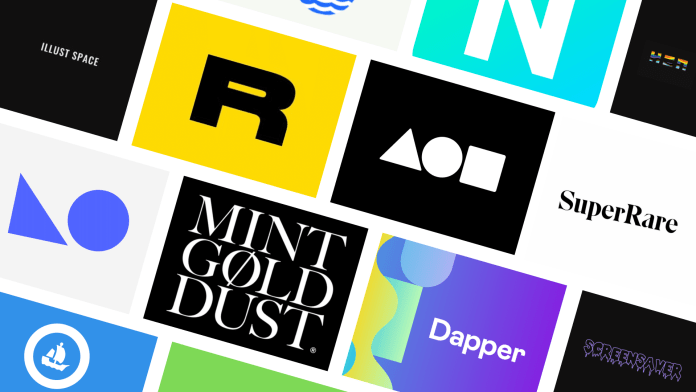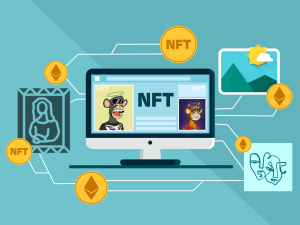Introduction to NFT Marketplaces
In the ever-evolving landscape of digital assets, Non-Fungible Tokens (NFTs) have emerged as a revolutionary concept, transforming the way we perceive ownership and value in the digital realm. At the heart of this phenomenon lie NFT marketplaces, bustling online platforms where creators, collectors, and enthusiasts converge to buy, sell, and trade these unique digital assets.
What are NFTs?
NFTs are unique digital tokens that represent ownership of a specific asset or piece of content, often leveraging blockchain technology to provide irrefutable proof of authenticity and ownership. Unlike cryptocurrencies such as Bitcoin or Ethereum, which are fungible and interchangeable, each NFT is distinct and cannot be replicated, making it a one-of-a-kind digital asset.
Understanding NFT Marketplaces
NFT marketplace serve as the primary hubs for trading NFTs, offering users a platform to showcase their creations, discover new artwork, and engage in transactions. These marketplaces provide a space where digital artists, musicians, gamers, and collectors can connect and participate in the burgeoning NFT ecosystem.
How NFT Marketplaces Work
NFT marketplace function as online platforms where users can list their NFTs for sale or auction, set prices, and interact with potential buyers. Buyers, on the other hand, can browse through a diverse range of digital assets, place bids, and purchase NFTs using cryptocurrency. Transactions on NFT marketplaces are recorded on the blockchain, ensuring transparency and immutability.
Benefits of NFT Marketplaces
Accessibility to Artists and Collectors
NFT marketplace democratize access to the digital art world, allowing artists from all backgrounds to showcase their work and monetize their creativity. Likewise, collectors have the opportunity to discover unique pieces of art and support their favorite creators directly, bypassing traditional intermediaries.
Transparency and Security
Blockchain technology underpins NFT marketplace, providing a transparent and secure environment for buying, selling, and trading digital assets. Each transaction is recorded on the blockchain, ensuring provenance and authenticity, while cryptographic techniques safeguard against fraud and counterfeit.
Challenges and Risks in NFT Marketplaces
Copyright Issues
One of the primary challenges facing NFT marketplaces is the issue of copyright infringement. As digital assets become more prevalent, questions surrounding intellectual property rights and ownership rights arise, leading to legal disputes and controversies.
Market Saturation and Competition
The rapid proliferation of NFT marketplace has led to market saturation, with an overwhelming number of platforms vying for attention. This intense competition can make it difficult for emerging artists to stand out and for collectors to navigate the vast array of options available.
Future Trends in NFT Marketplaces
Integration with Virtual Reality and Gaming
As technology continues to advance, NFT marketplaces are exploring new frontiers, including integration with virtual reality (VR) and gaming platforms. This convergence of digital art and immersive experiences opens up exciting possibilities for creators and collectors alike, blurring the lines between the physical and virtual worlds.
Increased Mainstream Adoption
Despite facing challenges, NFT marketplaces are poised for continued growth and mainstream adoption. As awareness of NFTs expands and barriers to entry diminish, we can expect to see a surge in participation from both creators and collectors, driving innovation and evolution within the NFT ecosystem.
Conclusion
NFT marketplaces represent a paradigm shift in how we create, consume, and interact with digital content. By harnessing the power of blockchain technology, these platforms empower artists, collectors, and enthusiasts to redefine ownership and value in the digital age. As the NFT market continues to evolve. It is essential to navigate the opportunities and challenges with a keen understanding of the transformative potential of this groundbreaking technology.
FAQs (Frequently Asked Questions)
- Are NFT marketplaces only for digital art? No, while digital art is a significant component of NFT marketplaces, they also encompass a wide range of digital assets, including music, videos, virtual real estate, and even tweets.
- How do I know if an NFT is authentic? Authenticity of NFTs is ensured through blockchain technology, which provides immutable records of ownership and provenance. Always verify the authenticity of an NFT by checking its blockchain transaction history.
- Can I sell my NFT on multiple marketplace simultaneously? Yes, in most cases, you can list your NFT on multiple marketplace simultaneously. However, it’s essential to review the terms and conditions of each platform to avoid any conflicts or violations.
- What cryptocurrencies are accepted on NFT marketplaces? The most commonly accepted cryptocurrencies on NFT marketplaces include Ethereum (ETH). To a lesser extent, other ERC-20 tokens. However, some platforms may accept additional cryptocurrencies, so it’s best to check beforehand.
- Are there any risks associated with investing in NFTs? Like any investment, there are risks associated with investing in NFTs, including market volatility, regulatory uncertainty, and potential loss of value. It’s essential to conduct thorough research and exercise caution before investing in any NFT.


good
It’s strange that people make money from predictive conceptions.